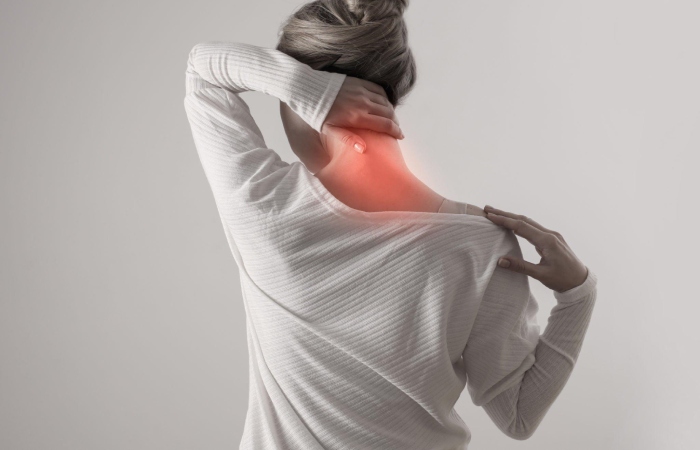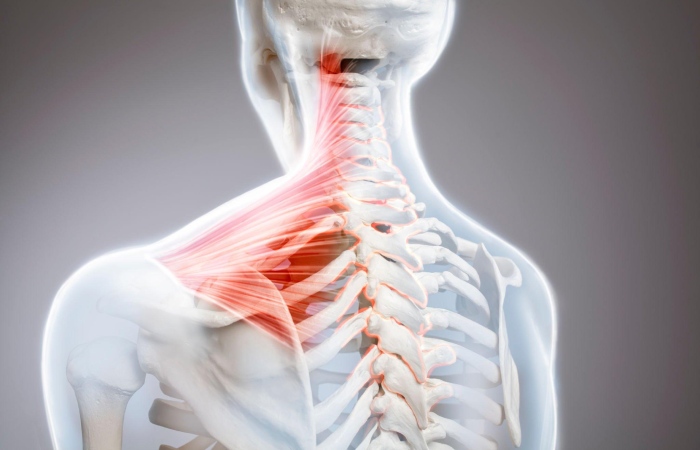Some people with covid go through neck pain covid, soreness, shortness of breath and Fever. In some cases, neck pain covid can remain an obstinate symptom of long covid. In covid, muscle pain is the most common symptom. Most of the time, it is minor and will go away in limited days. Still, on rare occasions, it may indicate a dangerous complication, such as meningitis.
Individual COVID-19 symptoms differ from person to person and rely on factors such as immunization history, COVID-19 strain, and coexisting medical problems. For instance, someone who already experiences neck or muscle pain may discover that COVID-19 worsens it.
Most of the time, neck pain brought on by COVID-19 can be treated at home. However, they should see a doctor if they experience severe symptoms or their neck pain covid does not go away.
Table of Contents
Is Neck Pain Covid a Sign of COVID-19?

One of the most prevalent signs of COVID-19 is muscle discomfort. An analysis of the literature from 2020 found that 11–62.5% of COVID-19 patients experienced muscle pain and soreness. In addition, joint pain affected 10-15% of the population.
Muscle soreness frequently affects many people’s neck pain in covid, shoulders, and back.
More subsequently, in 2022, when both Delta and Omicron were dominant variations, the researchers compared the symptoms of COVID-19. Again, the researchers for both genotypes discovered similar rates of joint and muscular discomfort—standard discomfort reports by more than 40 %Trusted Source of participants, and muscle aches by roughly 30%.
Muscle pain from COVID-19, particularly neck pain covid, has two main reasons.
The virus may target angiotensin-converting enzyme 2 receptors in the muscles. Each muscle is immediately impacted by this, which may result in soreness and suffering.
Experts also believe that discomfort may result from muscle inflammation. For example, when a person has a fever, the body’s immune system starts a chain of events that encourages inflammation. It can aid in the battle against infection, but it can also cause widespread muscle pain.
Muscle discomfort may also indirectly took on by COVID-19. For example, when unwell, a person’s muscles could feel stiff and sore if they spend days in bed. However, people rarely have neck pain due to other causes.
For illustration, a 2020 case report tracked a patient who was hospitalized with COVID-19 and experienced pain in the area of the front of the neck that houses the thyroid.
Anyone who exhibits meningitis symptoms ought to get help right once. Visit the hospital right away if you have a high fever and any of the following symptoms:
- very stiff neck
- light sensitivity
- confusion
- changes in personality or mood
Treatment for Neck Pain Covid
People without medical disorders that could enhance their chance of developing severe COVID-19 symptoms and with mild symptoms do not require further therapy. At home, they can control their symptoms or go for a few regualr check-ups to get help from doctors. Get your very first appointment from ArabiaMD.
They can try the following to alleviate their neck pain:
- Rest and replenish your fluids.
- Use a supportive pillow to minimize the pressure on your neck.
- To relieve pain and stress, massage or gently stretch your neck.
- You can also use over-the-counter pain medicines like ibuprofen.
Additional treatments might be available for people with specific illnesses, such as diabetes, heart disease, cancer, or conditions that impair immunological function. Paxlovid and monoclonal antibody treatment are two examples of these.
A doctor’s primary concern when treating patients with extended COVID is controlling and reducing symptoms. Unfortunately, there is no one treatment for extended COVID that is effective for everyone. Trials in research are ongoing to learn more about this illness.
8 Non-COVID Symptoms You Shouldn’t Ignore
Since the COVID-19 pandemic began, concern about possible exposure to the virus has made some patients understandably wary of going to the doctor or emergency department. At UCSF, we have implemented several procedures to decrease the risk of spreading COVID-19, including managing care through virtual visits where appropriate. It is essential to guard yourself against COVID-19 by getting vaccinated, wearing masks, washing your hands well, and practising physical distancing. It’s just as crucial for your health to recognize when you need medical attention in the emergency department.

1. Sudden discomfort in the chest, back, or neck pain covid.
Various mental and physical symptoms can indicate a stroke, seizure, or other serious problem. These signs include confusion or drowsiness, loss of coordination, strength, sensation, or balance, slurred speech, and facial drooping.
2. An abrupt change in behaviour or functioning
Various mental and physical symptoms can indicate a stroke, seizure, or other serious problem. These signs include confusion or drowsiness, loss of coordination, strength, sensation, or balance, slurred speech, and facial drooping.
3. Dizziness or fainting
If you have unexplained blackouts, lightheadedness, dizziness, balance problems, or a feeling that the room is spinning, you should evaluate by healthcare professionals. These symptoms have a wide range of possible causes that can treat in the emergency room.
4. Sudden loss of vision
An unexpected loss of visualization in one or both eyes, with or short of pain, could be a sign of a stroke, blocked blood flow to the eye, or a crucial problem inside the eye. Time is of the essence: the sooner you seek care, the better it will be.
5. Severe headache
Any new severe headache or a different type of headache than the ones you’ve had could indicate a severe problem, such as a stroke, riskily high blood pressure, an aneurysm (bulge in the wall of an artery), or another heart problem. Blood vessels or an infection.
6. Vomiting or intense diarrhoea
Vomiting or diarrhoea that cannot control can quickly lead to severe dehydration and dangerous loss of electrolytes, especially if you lose more liquid than you take in. You may need treatment with medications and intravenous fluids.
7. Continuous Fever
Fever that does not resolve with an over-the-counter fever medicine, especially if you also have pain, a rash, or any signs of infection, requires emergency evaluation.
8. Change in a heartbeat
Suppose you suddenly feel that your heart is beating faster or slower than normal, or is beating irregularly, and this sensation continues. In that case, you should be evaluated in the emergency room, especially if you also have lightheadedness, dizziness, shortness of breath, or pain.
Conclusion
However, in some people, a very stiff neck may be a sign of meningitis or another severe COVID-19 complication when combined with other symptoms, particularly changes in thinking or perception. Therefore, people who exhibit these symptoms ought to get immediate medical attention.

